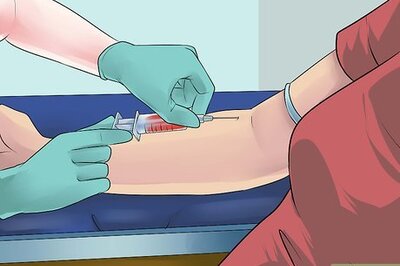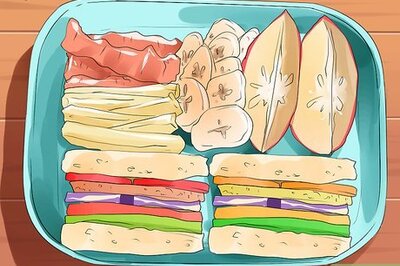
views
Thrissur: It was a usual day at the Divine Retreat Centre in Muringoor, Kerala on 14th August till floodwater started inundating the centre around evening. The retreat that houses a common space, rehabilitation centres for alcoholics, addicts and mentally challenged patients and a huge garden in its premises, was flooded in no time.
The institute, which calls itself the largest Catholic retreat centre in the world, had about 380 patients stranded in its mental rehabilitation centre along with 22 staff members. Further, it had about 50 odd patients in its centre for alcoholics and addicts. “We knew we were doomed,” said Father Jenson, who heads the centres.
The rehabilitation centres are about a kilometer away from the head office of Divine, from where it gets it food and water every day. Breakfast, lunch, dinner and snacks in between are transported from the head office at particular timings each day. The rehabilitation centres do not have a kitchen of their own.
When the centres started getting flooded on August 14, it hardly had enough food for its patients. The facility was running out of water supplies too. Nobody could venture out for help, owing to rushing flood waters.
At the centre for mentally-challenged, most of them did not know what was happening. “I remember the patients just gazing out into nothing. They didn’t realise what was happening,” said Sister Lilly, who was among the staff members stuck with the 380 patients.
There was, however, one thing that all patients realised-there was no food. Lilly looked back at the time when all patients would come to her and her colleagues asking for food. “They are used to hearing the sound of the vehicle from the head office at least three times a day. When they hear the horn, they know they would be fed soon,” she added. But since they had not heard the sound of the vehicle, they started getting anxious.
By the 15th, the first floor of the facility was flooded. The staff members shifted the patients to second floor and then started the web of lies. “We would be asked for food, and we’d keep telling them its coming. We lied through our teeth; there was nothing else we could do,” Sister Lilly said.
Most of the medicines are administered to the patients via food. With no food supply, the staff at the retreat centre found it hard to keep up with the medical requirements. “We had medicines but no food,” she added.
As time passed and water continued to flood the centre, Sister Lilly remembered two items that the centre had in its possession-about 300 grams of cashews and a bottle of gooseberry(amla) pickle.
“We fed them those cashews, at times cutting one into half. The patients would line up with their plates for it. If they asked for more, we’d tell them that their brothers and sisters would not have any if they had more than half of the cashew,” remembered Sister Lilly. The gooseberry, too, was cut like that.
“We administered the basic medicine (to keep them calm) in those halves that we fed the patients,” she said. Each patient was given a teaspoon of water to drink and Lilly remembered how the patients would lick their plate clean.
Next day, the staff at the mental facility suffered a blow. One of the patients had died. His condition had been critical for want of food and water, but his death was not expected. “We somehow managed to get his body out from the sight of the other patients before things went out of hand,” Sister Lilly added.
Her colleagues helped her take the body down to the first floor, where they placed it on a table which was relatively dry. While they believed the death to be the end of their trouble, the next day on 17th, they lost another inmate. A few hours later, the first rescue team came from the Divine centre office with food and water.
“Those three days were harrowing. I remember the inmates looking out and telling us someone was plucking a coconut or tapioca from a tree in the compound but near to the facility for addicts (which is about 10 metres from the mental centre). They would shout and tell us that there was food but it was not being shared,” she added.
“There was no way for us to get any help. Many people tried but in vain,” Father Jenson further said. Once the flood waters had receded, Lilly got the inmates out of the facility, as an attempt to show them the situation. With the trees destroyed and the ground full of muck, the patients kept asking what had happened to the centre. “What was I supposed to tell them?” Lilly sighed.




















Comments
0 comment